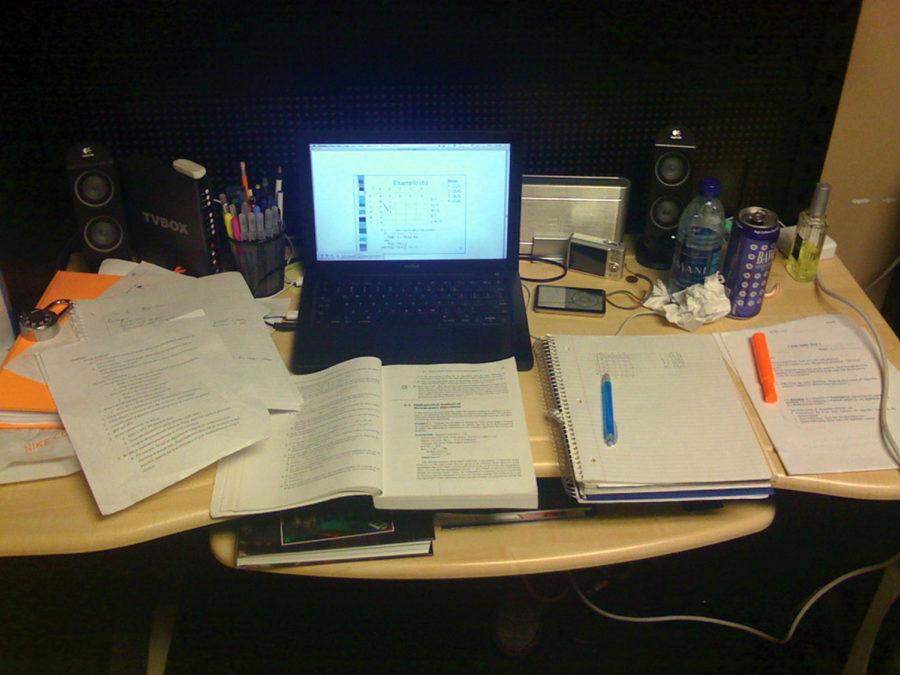Maxwell: Final exams should have limited impact
Photo courtesy of Flickr/Kory Twaites
Opinion: Maxwell
December 10, 2012
We are nearing the end of another semester at Iowa State, and for many students this means devoting a large amount of time to finals. Being both ready for a break from classes and anxious about performing well on these last important tests is a time many students truly understand how stressful it actually is to be a college student.
Though this increase in stress levels due to final exams should be expected and cannot be avoided, I feel that some of it might be unnecessary. Final exams are such a burden because sometimes they can significantly affect the grade for the entire course.
The impact of a final exam should not be overreaching. In particular, failing a final alone should not mean failure of the course. An otherwise well-performing student can be easily and unfairly affected by a single performance. I feel that when a final exam is worth a substantial part of the grade in a course, it signifies laziness on behalf of the grader. There is no reason a single chance to demonstrate proficiency in a subject should be considered sufficient enough to be representative of an entire course. This is especially true if the course is meant to be part of a system that promotes growth and learning.
I believe a higher number of tests in these situations is much more beneficial, to the teacher as well as the student. More tests given during the semester help to encourage students to regularly review the material and allow students to better understand a teacher’s grading preferences. Every teacher has his or her own unique preferences for creating and grading tests, and students should be able to adapt to these accordingly. Having more chances to be graded also demonstrates how well the student is doing in the class overall because the scores represent a performance trend. As those familiar with data analysis know well, a smaller number of samples will produce a less accurate result.
It is important for teachers to be aware of how well they are helping their students learn, and assessments more often is a very good way to show their students’ level of understanding. Overall changes in the class’s performance can show when the material is being covered too quickly or, when there is great enough comprehension, a subject does not need further explanation and the class is ready to move to the next topic. Being aware of how well the class as a whole is doing allows the teacher to do a better job of helping his or her students learn the course material.
It is not difficult to implement something more productive and more representative of a student’s knowledge and learning effort. For example, in a course that typically has two exams during class and one final exam, a former teacher of mine used the following system to determine test grades:
There were two midterm exams and one final. All tests were comprehensive and included all of the material up to that point.
An overall “test grade” was worth 45 percent of the class grade. This test grade was each student’s highest score out of the following options:
45 percent from only the final (the first two exams did not contribute); 25 percent from the final, 20 percent from the second midterm; 25 percent from the final, 20 percent from the first midterm; 17 percent from the final, 14 percent from the first midterm, and 14 percent from the second
This test grading system still required only two tests while in class, and one final exam after the course. But this system is adaptable to students who make the effort to learn the course material throughout the length of the class. It also does not punish students by hurting their course grade if they did poorly on a test but performed better on the others.
I would not necessarily suggest that this system be adopted to all relevant classes, but this is a good way to see that there are viable options for teachers to use when grading tests.
Final exams are important to ensure students have learned what was being taught in the course, most of the time to prepare them for another course that relies on that knowledge.
In general, the scores students receive on any exam should be able to represent each student’s own effort to understand the material.
But it is an unnecessary and unfair burden to both teachers and students if exams are not used in productive ways that actually encourage learning.

















